Let's be honest, ads and pop-ups are really annoying and only seem to get more and more intrusive. Luckily, a good ad-blocker can help you avoid these irritating interruptions, so you can browse the web without needing to worry about full-page video adverts suddenly blaring in your ears.
By using an ad-blocker, you will improve your online privacy, speed up website loading, and protect your devices from spyware. When you visit a website, your computer wastes both resources and internet bandwidth by loading adverts. These could be banner ads, pop-ups, or Google placement ads – whatever form they take, your computer can load pages faster when you block them. It's also worth noting that some websites hide spyware and malware in ads, so blocking them is often a necessary safety precaution.
The increasing popularity of ad-blockers means that there are hundreds of services out there. This makes it difficult to choose the best ad-blocker for your needs. Fortunately, there is something for everyone on our list of best ad-blockers.
What are the best ad-blockers?
We have listed what we think are the best ad-blockers in 2026. If you want more information, please continue scrolling to find out the pros and cons of each service.
- Total Adblock - Best adblocker in 2026.A secure ad-blocker for Android, iOS, PC, and Mac. With premium, you also get anti-malware and anti-virus protection.
- CleanWeb - CleanWeb is Surfshark’s all-in-one ad-blocker, cookie pop-up blocker, and alert service for malware and data breaches. It comes free with Surfshark subscriptions and is available as a browser extension or via any of the VPN apps.
- AdLock - Offers exceptional functionality and it's highly customizable.
- AdGuard - The most feature-rich ad-blocker, with excellent apps for Android, iOS, PC, and Mac. Offers extensions for all popular browsers, plus it's affordable.
- uBlock Origin - The best free browser ad-block extension around. It's an open-source service that's both lightweight and feature-rich.
When putting together this list, there are several things that we considered. These are:
- Effectiveness of blocking ads
- The impact they have on your computer's memory resources
- Are they compatible with popular browsers –e.g. Chrome, Firefox, Safari, etc?
The best ad-blocker in 2026
After testing several services, we found that these are the best ad-blockers in 2026.
Total Adblock is the best ad blocker in 2026. Get full protection with TotalAV (anti-virus) and an exclusive YouTube ad-blocker. Total AdBlock is a leading adblocking solution in the market. It effectively removes all types of online advertisements, including banners, pop-ups, and even YouTube ads. This ad-blocker works as an extension for all popular web browsers. So, regardless if you're a Chrome, Microsoft Edge, Safari, Firefox, or Opera user, Total Adblock will help you regain control over your surfing experience – making it faster, safer, and hustle-free. Not only does Total Adblock block annoying ads across the web, but it's also a powerful tool against tracking and third-party cookies. That means advertisers get far less opportunity to snoop on your activities and collect your data, which significantly reduces the chances of your sensitive information getting abused, and improves your overall privacy online. Created by an award-winning antivirus provider TotalAV, and praised for its Savapi anti-malware engine, Total Adblock Premium is much more than just an ad-blocker. What's more, if you opt for Premium, you get its superb anti-malware and anti-virus protection for free – a valuable package worth trying out, especially since there's a 30-day money-back guarantee included in the offer. Total Adblock is very lightweight by design, however, it's loaded with useful features. It offers an unlimited ad and tracking blocking service, plus it allows you to whitelist as many websites as you want (those you find trustworthy or wish to support). You can toggle this feature, called Acceptable Ads, according to your preferences and as many times as you want, which is very convenient should you change your mind about a website. It also allows you to experience a truly personalized ad-blocking service. Quiet Mode is available too, thanks to which, you can disable pesky push notifications and manage your browsing history (clear cookies, cache, and similar). These features are not only super useful privacy and security-wise, but they also help you achieve much shorter page loading times (some sites that I tested loaded over 50% faster with Total Adblock on). Not to mention that they make your life much easier. If you're looking for a well-rounded service that includes all the above, plus an excellent customer support team that can guide you through the entire installation process and is available 24/7, Total Adblock could be just the right choice for you. If you are more of a DIY type, an extensive knowledge base comprising tutorials (How to install Total Adblock on Android, iOS, etc.), guides, and a list of FAQs is available on Total Adblock's official website too. So, even if you are a complete newbie, it is most likely you won't face any difficulties setting up and using this ad-blocker. And, even if you do, you can always contact customer support, which, in my experience, is usually super quick and efficient. Surfshark’s ad-blocker removes ads before a page displays – including video ads from streaming services. The blocker forms part of the CleanWeb service, which comes free with all Surfshark VPN subscriptions. Surfshark’s CleanWeb is an ad-blocker and cookie pop-up blocker, as well as an alert service for malware and site-specific historical data breaches. It’s available as part of every Surfshark subscription – through either the VPN app or browser extension. The latter has more functionality than the former, which only enables users to toggle the service on and off. Opening the CleanWeb 2.0 browser extension takes you straight to the dashboard, which is as clean and intuitive as other Surfshark products. If you land on a website that doesn’t work with CleanWeb, you can add its URL to a bypass list by clicking the plus symbol in the upper-right corner of the screen. Here you can also specify if you want the site to also bypass the VPN. The ad-blocker removes a host of adverts – including the video ads most commonly served by streaming providers. The pop-up blocker, meanwhile, prevents cookie requests. It acts in the background, rejecting any that are possible to reject and only accepting those that are strictly necessary for the chosen website to work. The third feature – the data breach alert – notifies you if the site you’re on has ever been involved in a data breach. If it has, CleanWeb tells you when it happened and how many accounts were exposed. The malware detector tells you if any viruses or malware have been detected. The CleanWeb 2.0 browser extension is available for Chrome, Firefox, and Edge browsers. As part of the Surfshark app, CleanWeb is available on iOS, macOS, Android, Windows, Linux, and Amazon FireTV. AdLock is a great standalone ad-blocker for Android, with an impressive range of customization options. Offers great functionality for browsers and apps, and you can choose between plans. AdLock is one of the best ad-blockers currently on the market in terms of functionality and advertising/tracking blocking and analytics. While there's no free tier, it offers a variety of reasonably priced subscription options, allowing you to pay month-by-month, for one year, or for five years. It’s a little more intensive on resources than browser-based alternatives for mobile, but as a separate application, it can prevent auto-playing videos, pop-ups, and general advertisements mobile-wide and offers detailed stats to allow users to delve into what ads, trackers, and suspicious activities are being blocked. If you've ever wanted to see exactly who and what is trying to serve you ads and trackers as you browse the internet, then AdLock is a great choice. From basic statistics showing you which URLs are being blocked, to reports on suspicious requests, intrusion attempts, and more, AdLock allows you near total control of what is, and isn't, allowed on your machine. The only minor complaint here is that these features might be a little intimidating to new users, but you don't actually need to use any of them. Just turn AdLock on, make sure to hit that "Check for updates" button every now and again, and it'll just get on with things in the background. AdLock offers protection on a per-app basis, allowing you to add and remove browsers and other programs as well as choose whether you wish to apply filters. You can even block an app entirely from the internet if you think it's being used just to serve you adverts. Where AdLock truly shines is that you can use it to block ads in all manner of apps, not just web browsers. Candy Crush showing you too many ads? Block them. Being forced to watch 20 seconds of adverts for a 2-minute-long YouTube video? Not anymore. Simply add the app into AdLock and kiss goodbye to adverts. You can reach out to AdLock support through the browser or directly through the app. This is how you engage their support team if you find any sites that AdLock does not work with. We reached out to their support service when we found two sites that didn't work during our testing and in less than 90 minutes, they'd released an updated filter list that enabled both sites to work flawlessly. If this is the level of support all AdLock users can expect, then we are genuinely impressed and we think you will be too if you try it out risk-free with its 30-day money-back guarantee. AdGuard is a feature-rich and highly customizable ad-block extension for Android, iOS, PC, and Mac. It works both as a stand-alone solution and browser extension. AdGuard is another great stand-alone ad-blocker, available for all popular devices, including Android, iOS, PC, and Mac. Same as AdLock, this service offers more than just a browser extension. It works with many apps that would usually pester you with adverts, including YouTube and Twitch. You get to enjoy faster and smoother browsing and streaming without interruptions, and save on bandwidth and system resources that are typically wasted on ads and cookies activities. AdGuard comes with many useful features and impressive customization. You can set up and customize different filters for all kinds of ads and trackers, individually, or all at once. Ad-blocking filter categories are already listed and well-organized, which helps to speed up the customization process, including super useful social media-related filters (we all know how annoying these can be). What's more, AdGuard filters code from sites before they even load. This stops ads before they begin their download, saving a substantial amount of your time and system resources. Another great AdGuard feature is Stealth mode, which comes with an array of options for blocking. This mode stops ads and trackers, but also a range of other files and components that could compromise your security. With AdGuard, you have options to hide your search queries (so websites can't keep track of them), protect your IP address, block or limit cookies, and many others. All these can make a tremendous difference in protecting your privacy and keeping you safe online. One of the best things about AdGuard is that it comes in different shapes and forms, so it can suit all your needs on a day-to-day basis. And so, you can choose between a stand-alone desktop version available for your macOS and Windows devices or a browser extension that works across all popular browsers, including Google and Safari. You can download and use any basic AdGuard protection (on an individual device) for free. However, should you wish to try upgraded versions, two of them are available for purchase. They offer additional functionality and can be used on up to nine devices. Besides, a paid version comes with a generous 60-day money-back guarantee – which means you can try it risking no cash. uBlock Origin is the best free browser ad-block extension. It offers a lightweight and effective adblocking service, with plugins for most popular browsers. uBlock Origin (uBO) is a popular free and Open-source cross-platform ad-blocker that also has some quite effective anti-tracking capabilities. uBlock Origin is a fork of the original uBlock, so don't get the two mixed up! The original uBlock is now part of Adblock Plus and takes part in the whitelisting of some adverts, so if you're looking to block as many as you can, then make sure you get uBlock Origin. uBlock Origin is an unobtrusive, lightweight offering compared to some competitors, but that doesn't mean it's bringing a wiffle bat to a knife fight. It's got custom blocklists, dynamic filtering, element inspector, and zapper so you can block specific parts of a website, site-specific pop-up blocking, and even the ability to whitelist sites that you want to support directly or where the adverts aren't too intrusive. These days, most browsers try to speed up the browsing experience by preloading the other links on a page while you are busy reading that page, whether you have any intention of clicking on them or not. Not only does this waste bandwidth unnecessarily, but if you are not using a VPN to hide your IP address from these pre-fetched pages, it further exposes your personal details to these sites without you ever visiting them. Fortunately, this is an issue that uBlock Origin can fix. Besides advertising block lists, uBlock Origin also uses lists of known malware distributors to automatically block those for you as well! All of uBlock's block lists are further maintained by a community of volunteers, no compromises are made to whitelist certain sites, and no worries that it might be doing something nefarious with your data. CyberSec is an easy-to-use ad-blocker. It's a no-frills service that comes bundled with a NordVPN subscription for no extra cost. NordVPN's CyberSec option isn't free like some of the other options on this list, as part of a NordVPN subscription, but it's still a compelling offering, especially when bundled with an industry-leading VPN to further secure your connection and online privacy. While it lacks in-depth customization options, literally being either ON or OFF, it still offers a good level of protection against all kinds of malware. While perhaps lacking the functionality that power users will crave, NordVPN's CyberSec is a great way for novice users to further secure their internet connection. With no configuration needed, users can simply turn it on and leave it running in the background, confident that NordVPN has their backs and will be actively protecting them from malicious sites, ransomware, and more. CyberSec, and other security products, use filter lists of dangerous/suspicious websites to identify potential threats as you browse the internet. It scans any address you enter against these lists and if it finds a match will block access to that site before you can connect to it. In this way, it ensures you cannot accidentally browse to any sites known to host malware. Really, the only reason not to recommend this product is that it's all-or-nothing, on or off, there's no way to customize it, no way to set up your own filters to avoid specific sites, or even to work around potential false flags which do happen from time to time. That said, it's a useful tool if you already have a NordVPN subscription and a great way for the non-technical user to further secure themselves online. AdFender is a tried and tested desktop application for Windows PCs. It provides great ad-blocking and masses of customization options. While AdFender no longer offers a free option as of version 2.50, but it remains one of the best ad blockers for Windows PC users, offering official support right up to Windows 10. It's one of the cheaper paid ad-blockers out there, available for as little as $15.95 per year. It has been tried and tested using a wide range of browsers, including Waterfox and Pale Moon, two of the more privacy-focused browser offerings out there. Similar to AdLock, AdFender works by running as a proxy server on your PC to filter out potentially dangerous content. It filters all the web traffic from your machine, and if it detects that the URL that's trying to load is one that's used to serve adverts, it blocks it. It's even cable of filtering secure HTTPS connections and helping to anonymize your online presence by routing all your traffic through the Tor network, though this will hurt your connection speeds, as Tor is not known for being particularly fast. As with AdLock, AdFender is installed on the operating system rather than just as an extension in your browser, so it can protect more than just your web browsing. As well as sporting an impressive list of supported browsers that includes not only the big, well-known ones but all kinds of smaller, niche browsers as well including Yandex, Epic, and more. It can also work with various instant messaging clients. It does all this without having a major impact on your system resources too. AdFender helps not only speed up your browsing experience, webpages load faster when they don't need to waste time loading intrusive banner and video ads, but it saves you bandwidth as well. By automatically detecting and rejecting advertising URL requests, it protects people on metered connections from frittering away their precious download allowance on potentially malicious adverts. 1Blocker is one of the original and best ad and tracking blocking apps for iOS devices. Offers a great deal of customization. 1Blocker (formerly 1Blocker X) was one of the first ad-blockers for iOS devices such as iPads and iPhones, and remains a popular and effective choice for Apple users. While it is limited to only blocking adverts in the Safari browser, it does it very well and is still a useful tool for saving both system resources and bandwidth by preventing content from downloading in advance. It does have a free tier, but the paid version requires only a small onetime payment to unlock all its features and filtering options. It would be unfair to call 1Blocker "just" an ad-blocker. It's capable of blocking not only unwanted ads, but all manner of social media trackers, all those widgets for sharing content on multiple platforms, and it can even block custom fonts which can be a help to those who have dyslexia. One of the most interesting options is the ability to block those oh-so-annoying "here's how we use cookies" banners that have been a pox on the internet since the introduction of the EU's ePrivacy Directive in 2018. A recent update to 1Blocker has seen it expand its tracker-blocking functionality outside of just the browser. Sadly, there's still no system-level ad-blocking, but now you can block all those pesky social media trackers in other apps as well as just Safari. Building on 1Blocker's App Tracking Transparency, which forces apps to ask for permission before they track you, Firewall now just automatically blocks the trackers, adding another layer of privacy and security between you and companies eager to track everything you do online. Out of the box, 1Blocker is already a solid choice for an ad-blocker, but it builds on this foundation by providing the functionality to create custom rules. It will allow you to create your own custom filters to block any URL you like by using a regular expression or hide any element in CSS. However, this feature is only available to paid users, otherwise you're stuck with just the default filters, which are still nothing to sneeze at as these are kept regularly updated by 1Blocker. 1. Total Adblock
Pricing
Great privacy tool
Feature-loaded
All-round service
Pricing
 The CleanWeb 2.0 browser extension consists of four tools: the ad-blocker, pop-up blocker, data breach notifier, and the malware notifier.
The CleanWeb 2.0 browser extension consists of four tools: the ad-blocker, pop-up blocker, data breach notifier, and the malware notifier.
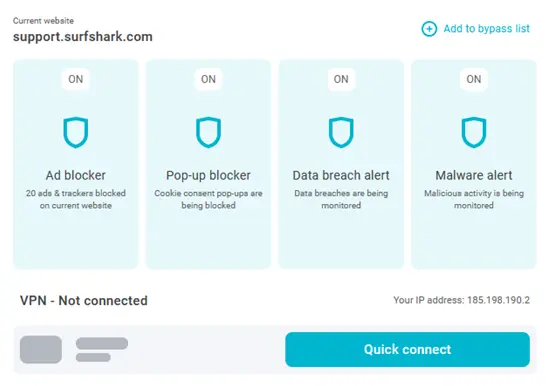 In the browser extension, you can choose which of these features you want to enable via the CleanWeb settings tab. Note that it isn’t necessary to be connected to the VPN for CleanWeb to function.
In the browser extension, you can choose which of these features you want to enable via the CleanWeb settings tab. Note that it isn’t necessary to be connected to the VPN for CleanWeb to function.
Pricing
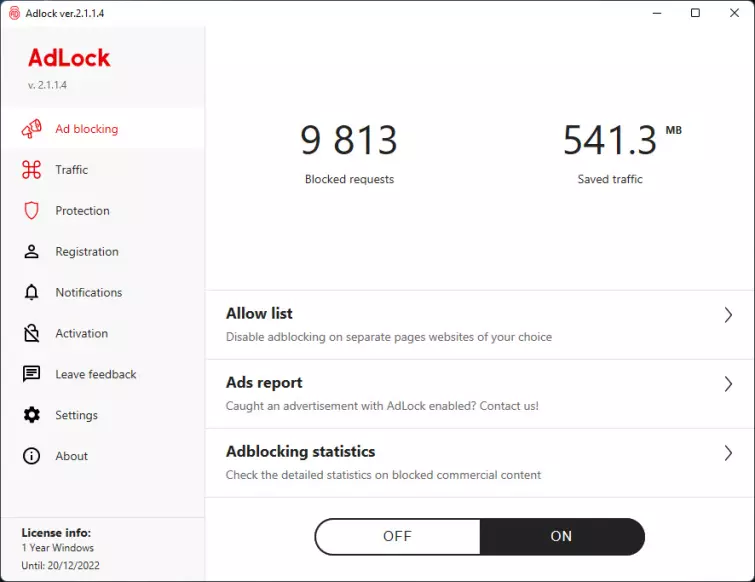
In-depth information
![]()
Massive customization
Responsive support
Pricing
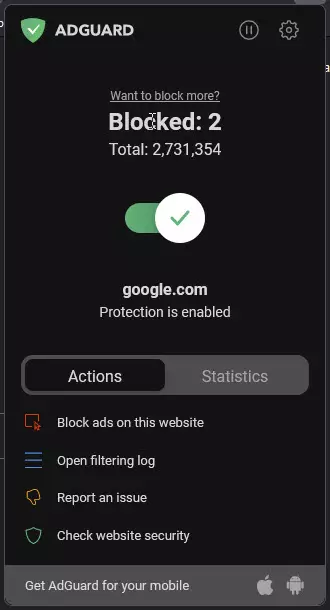
Highly customizable
Guarding your privacy
Protects all your browsers, apps, and devices
5. uBlock Origin


Feature heavy

Block pre-fetched links
Malware protection
6. CyberSec (NordVPN)

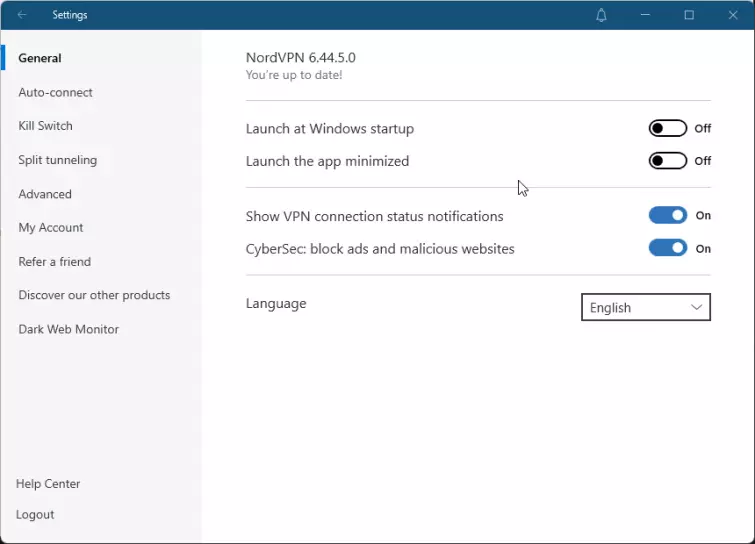
Foolproof functionality
Blocking malicious websites
A little too simple
7. AdFender

Pricing
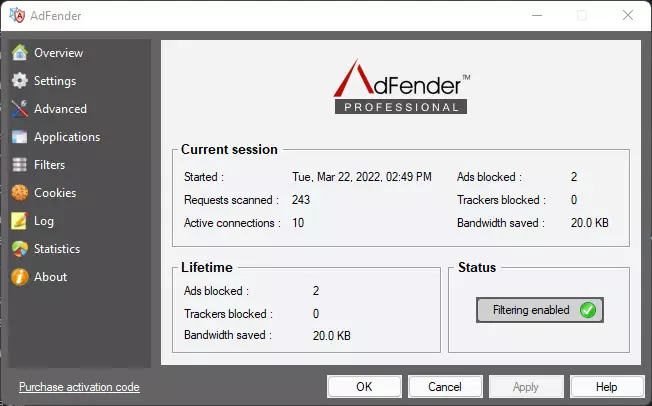
HTTPS filtering
Browsers and more
Better browsing
8. 1Blocker

Pricing
Better browsing
Tracker blocking
Fully customizable
Compare key ad-blocker features
When putting together this list, there are several factors we considered to ensure that we only recommended the best ad-blockers. These include the following-
- It is compatible with mainstream browsers?
- Is it open-source or closed?
- If it has a dedicated app, or just a browser extension?
And more points besides. See the table below to see how the services above compare on these factors:
| No Value | Total Adblock | AdLock | AdGuard | uBlock Origin |
|---|---|---|---|---|
| Firefox | ||||
| Chrome | ||||
| Edge | ||||
| Safari | ||||
| Windows | ||||
| macOS | ||||
| Linux | ||||
| Android | ||||
| iOS | ||||
| Open source | ||||
| User-definable blockists | ||||
| Tracking protection |
Why do I need an ad-blocker?
Companies tend to prioritize profit over user experience; making deals with dodgy advertising firms and slowing their webpages down by filling them to the brim with video, audio, and text adverts. These ads are not only incredibly annoying, they can slow your system to a crawl, and even direct you to malicious websites when you click on them.
Ad-blockers are designed from the ground up to help consumers avoid the manipulation of brands and ad companies, stopping advertisements before they have a chance to appear on your screen. After installing one, you will probably immediately see faster loading times for websites, which will help conserve battery life for laptops and mobile devices.
You'd be forgiven for thinking this is where an ad-blocker's functionality ends, but some products are capable of so much more. As well as blocking ads, as the name suggests, they help to protect users from malicious advertisements known as 'malvertising', used by attackers to install harmful code onto your device. This is often done by redirecting the user to a compromised or fraudulent website, or by piggybacking a stealthy malicious download onto an unsuspecting victim's device, in some cases, even without them clicking on the advertisement itself.
Ad-blockers have proven instrumental in the battle for digital privacy as websites continue to siphon ever-increasing amounts of user data. Some advertisements are infamous for tracking each click a user makes, building a profile of interests that includes intimate information such as age, location, friends, personal preferences, and more.
Learn more about ad-blockers
Check out our what is an ad-blocker guide for some information about what they are, how they work, and the benefits of using them.
Types of ad-blockers
Not all ad-blocker tools are the same. They come in a variety of different forms. While some types are more popular than others, it's imperative to weigh up the pros and cons to determine the best ad-blockers for browsers such as Chrome, Firefox, or Safari, operating systems such as Windows 10, Android, or iOS, and the myriad of other devices out there.
Browser extensions
Whether a user opts for a company-owned piece of software, such as Google Chrome, or open-source offerings, almost all browsers come with built-in ad-blocking features to avoid adware. Sadly, these measures are often limited, with most turning towards extensions to make the most of a browser's capability.
Of course, Chromium-based browsers have the largest selection of ad-blocking extensions thanks to Chrome cornering most of the global market when it comes to web browsers. Although Firefox has a good range available, support for others listed in our top 5 most secure browsers built for privacy is few and far between. Users also risk vulnerability to browser fingerprinting when utilizing many extensions, resulting in a need for extra protection such a Canvas Defender for Firefox.
Free isn't necessarily good
At first, it might seem like a blessing that many ad-blockers are free to use, but unfortunately, not all of them can deliver the same level of privacy a consumer expects. Some make their money by discretely whitelisting the advertisements for companies that opt-in to share revenue with the developer, while others sometimes operate by collecting and selling the data of users themselves.
Pros of browser extensions
- Easy to install
- User-friendly
- Customizable
- Large selection of paid and free ad-blockers
Cons of browser extensions
- Support/functionality varies from browser to browser
- Vulnerability to browser fingerprinting without added protection
- Some free ad-blockers aren't as private as they seem
VPNs with ad-blockers
Virtual private networks (VPNs) are vital when it comes to online privacy due to their ability to hide what you get up to on the internet, making them the perfect tool to pair up with ad-blockers. Some VPN developers have cut out the middle-man by offering ad-blocking features within their service, too, leaving more time for privately browsing the web and less time hunting for the perfect software.
As a one-stop-shop, users reap all the benefits of a traditional ad-blocker alongside the function of a VPN, making it incredibly difficult for adware to form a profile. The bundles are often a part of premium subscriptions, which enable a user to protect multiple devices at once.
With the built-in program being a paid feature, there is no funny business as to how the company is making money, but this makes it less accessible than some browser extensions. The primary drawback, however, is that ad-blocking cannot be used independently as the function only activates when connected to the VPN.
Pros of VPNs with ad-blockers
- Comes bundled with a VPN
- One-stop-shop for privacy
Cons of VPNs with ad-blockers
- Requires a premium paid subscription
- Ad-blocker functionality cannot be used independently
Ad-blocker desktop applications
Although it's a much more unconventional method of getting rid of advertisements, there are a few ad-blocker applications that can be directly installed onto desktops.
Unlike extensions, since these are installed on the device itself rather than added to individual browsers, these programs have the ability to prevent advertisements from appearing on multiple browsers at once – which is handy given that having more than one browser installed is always encouraged. Even advertisements baked into other applications and Windows 10 have a hard time against these ad-blocker apps.
Also, in contrast to extensions, ad-blocker apps have a tendency to take up a larger amount of system resources, even when not in use. Strictly free versions of the programs also remain restricted or have fallen behind on development compared to their paid alternatives, leaving them less useful.
Pros of desktop ad-blocker applications
- Covers multiple browsers and programs
Cons of desktop ad-blocker applications
- Resource heavy
- Free versions are usually restricted or out-dated
- Not much of a selection
Router-loaded ad-blockers
With a little know-how, it is possible to load ad-blockers onto dedicated or virtual routers, preventing advertisements at the Domain Name System (DNS) level. The implementation will depends on the interface of each individual router, and while they are often trickier to set up than alternatives, they yield the biggest results.
While previously mentioned ad-blockers stop advertisements from appearing, most do nothing to prevent the web page from downloading personalized banners, images, and videos based on a user's browsing history and stored cookies. Prohibiting these advertisements from loading at the DNS level not only maximizes performance but caters to multiple devices in the household, let alone multiple browsers.
Preventing advertisements using DNS is usually a blanket-wide block that can sometimes be customized by the user based on how strict their settings are. There is a risk of select webpages breaking and commercial sites being caught in the crossfire, both of which can be remedied by manually whitelisting. No router-based solution is as accessible as its local brethren, but as mentioned earlier, this is particularly dependent on the router's user interface.
Pros of router-loaded ad-blockers
- Caters to all devices within the premises
- Stops the loading of advertisements as well as showing them
Cons of router-loaded ad-blockers
- Can be fiddly to set up
- Not as user-friendly to manage
Conclusion
The best ad-blockers can handle more than just the occasional pop-up or annoyingly large banner advert. If you want to improve your overall internet experience and prevent your computer from being slowed down by torrents of ad campaigns, then an ad-blocker is a great tool. Here's a reminder of our top picks for the best ad-blockers:
- Total Adblock - Best adblocker in 2026.A secure ad-blocker for Android, iOS, PC, and Mac. With premium, you also get anti-malware and anti-virus protection.
- CleanWeb - CleanWeb is Surfshark’s all-in-one ad-blocker, cookie pop-up blocker, and alert service for malware and data breaches. It comes free with Surfshark subscriptions and is available as a browser extension or via any of the VPN apps.
- AdLock - Offers exceptional functionality and it's highly customizable.
- AdGuard - The most feature-rich ad-blocker, with excellent apps for Android, iOS, PC, and Mac. Offers extensions for all popular browsers, plus it's affordable.
- uBlock Origin - The best free browser ad-block extension around. It's an open-source service that's both lightweight and feature-rich.





